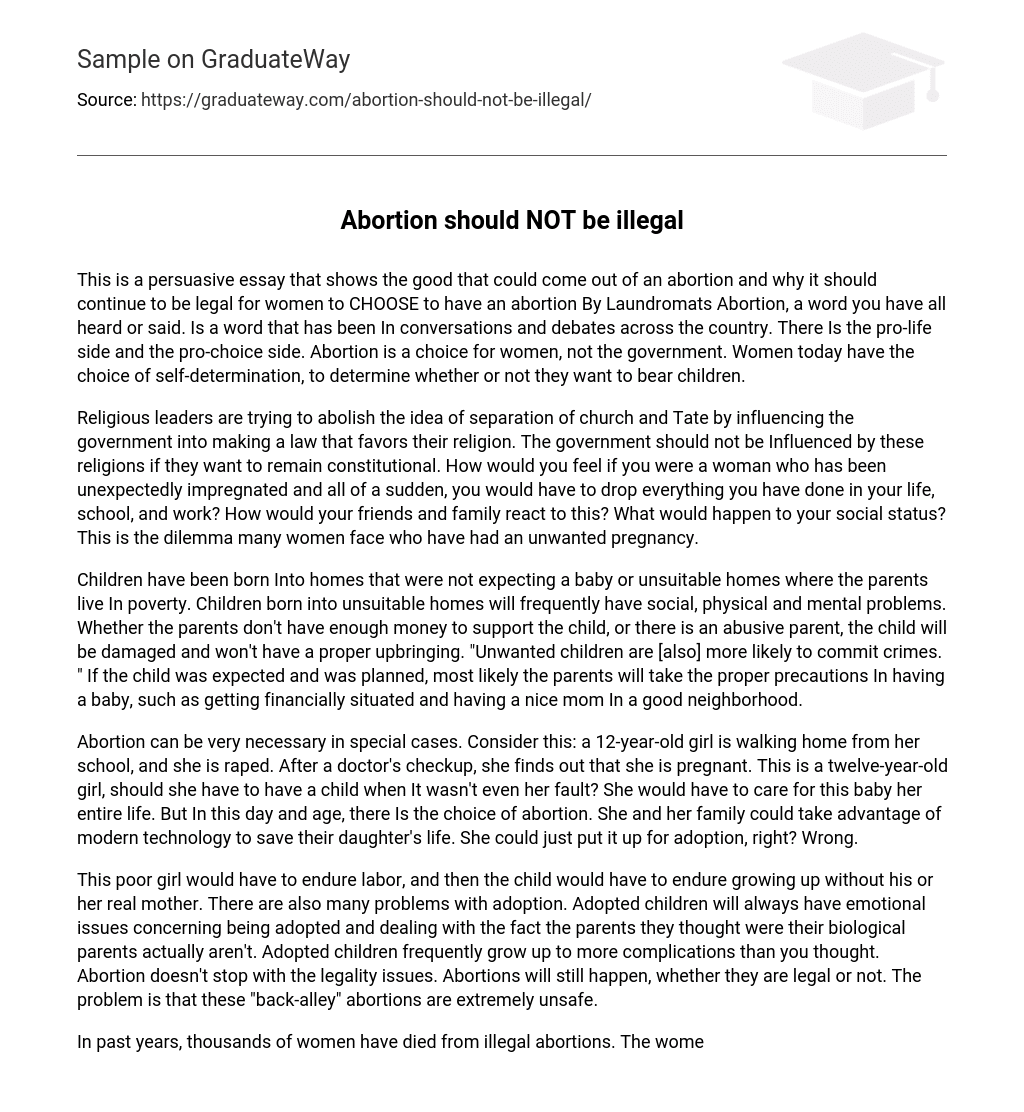This essay advocates for the benefits of abortion and supports its ongoing legality as a means for women to exercise control over their decisions. The term “abortion” has sparked widespread discussions nationwide, with two opposing perspectives: pro-life and pro-choice. It is crucial to acknowledge that abortion should be an individual choice made by women, without interference from the government. In contemporary society, women possess the autonomy to make determinations regarding their own lives, empowering them to choose whether or not they wish to pursue motherhood.
Religious leaders are trying to undermine the principle of separation of church and state by using their government power to pass laws that benefit their religion. It is essential for the government to resist these religious pressures so that constitutional values can be maintained. Imagine a situation where a woman becomes pregnant unexpectedly, leading to her giving up on her education and career goals that she has worked hard for. Consider how her friends and family would respond to this situation and understand the impact it would have on her social standing. Many women facing an unwanted pregnancy find themselves caught in this challenging predicament.
The birth of children in unforeseen or inappropriate surroundings can lead to social, physical, and mental challenges. Factors such as financial limitations or having an abusive parent can negatively impact a child’s development and upbringing. Additionally, unwanted children are more prone to engaging in criminal activities. Conversely, when a child is planned for and expected, parents are inclined to undertake essential measures like ensuring financial stability and residing in a favorable community.
Abortion is sometimes needed in particular situations, like when a 12-year-old girl is raped and becomes pregnant. It’s crucial to acknowledge that this young girl should not be compelled to carry and raise an unplanned child. The lifelong responsibility of caring for the baby would weigh heavily on her. Fortunately, contemporary society provides the choice of abortion, enabling her and her family to utilize technology for safeguarding their daughter’s future. Although adoption may appear as an alternative option, it isn’t feasible.
This unfortunate girl will have to endure the process of childbirth and thereafter, face the challenges of growing up without her biological mother. Adoption also presents numerous difficulties as adopted children often grapple with emotional problems linked to their adoption and the realization that their presumed biological parents are not actually their biological parents. Adopted children frequently encounter more complexities than expected.
The legalization of abortion does not entirely eliminate the problem. Abortions will continue to occur, irrespective of legality. The concern lies in the significant safety hazards associated with these “back-alley” abortions.
Historically, many women have died from illegal abortions while trying to assert their right to self-determination. Abortion is a highly contentious issue influenced by cultural and religious viewpoints. The Roman Catholic Church, Hinduism, and Buddhism believe that the soul enters the body at or before conception. In contrast, Judaism, Islam, and Atheism argue that a fetus does not possess complete humanity and therefore ending its life is not considered murder. Of these belief systems, the Roman Catholic Church particularly emphasizes its strong position on this topic.
There is a debate regarding the claim that abortion ends a human life. Opponents are challenging this argument, particularly religious leaders associated with the Roman Catholic Church. They are working towards turning their beliefs into laws across the country. Their goal is to remove the constitutional principle of separation between religion and government. Their argument is based on the belief that since most people consider abortion morally wrong, other religions should also adopt this viewpoint. However, this perspective disregards the existence of various religions in America.
The Constitution embodies the idea of the right to life, liberty, and the pursuit of happiness. If women have these rights, it means they are free to live a fulfilling life and seek happiness. Should exercising this right involve not having a child, then abortion becomes their choice. Additionally, an amendment ensures the protection of privacy in the Constitution. The fourteenth amendment specifies that individuals have a right to privacy, including a woman’s ability to end her pregnancy. Any law criminalizing abortion contradicts this fundamental principle.
The argument for the legality of abortion is based on the Due Process Clause of the fourteenth amendment, making it unconstitutional. This viewpoint was first established in the Roe v. Wade case. In essence, a woman should have complete authority to choose whether or not to undergo an abortion without interference from government or religion. Ultimately, it is her decision, considering her financial and emotional capability to raise a child and provide a safe environment. Banning abortion would violate both a woman’s right to privacy and her rights to life, freedom, and pursuit of happiness.
When facing an unwanted pregnancy, it is crucial to recognize the significant impact it can have on a person’s life. It is important to understand the difficulties that women may face when raising a child under adverse circumstances like poverty and abuse. Moreover, we should consider the future of children who grow up in unsuitable homes and experience persecution from a government that could have intervened to protect them. Ultimately, the government must make a crucial decision: whether to follow religious leaders who believe abortion is morally wrong or contemplate whether abortion signifies ending a life or, alternatively, preserving one.





